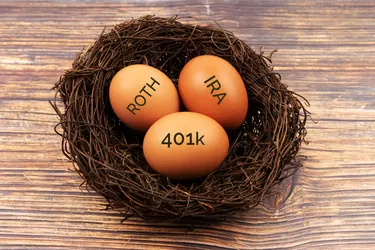If you were hoping to put some money into your Roth IRA, there's some last-minute good news for you. Legislation that could restrict backdoor Roth IRA contributions won't go into effect at the beginning of 2022 as planned, which means you may be able to slide some money into your IRA during the tax year. High-income earners interested in looking for a way to reduce taxable income could find that this is a great option.
What Is a Backdoor IRA?
Video of the Day
To reduce their tax burden, some taxpayers choose to move some money each year into an IRA. In addition to saving them a little money on their tax returns, this lets them set funds aside for retirement. But the IRS's contribution limits on Roth IRAs prohibit those earning an annual income of $140,000 or more, or $208,000 for those married filing jointly, from moving money into an IRA.
Video of the Day
That's where the Backdoor IRA comes in. This particular strategy has you putting your money in a nondeductible vehicle like a traditional IRA, then converting it to a Roth. Although you're limited to $6,000 a year, or $7,000 for those 50 and over, those limits are looser with traditional 401(k)s, which can also be converted to Roth IRAs.
There's also something called a mega backdoor Roth. This is a more complicated strategy that lets those with workplace 401(k)s put $38,500 of post-tax dollars into that plan, then move it over into a Roth. This type of setup can lead to hefty tax bills, so it's something best executed by a financial advisor or brokerage firm.
Consider also: Is It Too Late to Fund Your Retirement Account?
The Backdoor Roth Restriction Hold
The Build Back Better Act, which has been making its way around Washington, threatened to put restrictions on backdoor Roth IRA conversion for many Americans. But that piece of legislation is on hold, which is good news for taxpayers hoping to slide a little extra money into their Roth IRA this year.
With the Build Back Better Act, these backdoor rollover contributions would be shut off completely. The bill originally called for eliminating all voluntary after-tax contributions from being converted to Roth after-tax contributions. This would have gone into effect Dec. 31, 2021.
The Hold and Retirement Planning
The news was a big relief to those who rely on those annual contributions to build tax-free retirement savings. But even if you haven't been taking advantage of this strategy, it's not too late. In fact, this might be a good year to sock some money away in case the legislation goes through and the loophole does close.
You don't need an expert to get around the income limits on IRA accounts. You'll just need to put money into your traditional IRA up to the limit, and then immediately move that money over to a Roth IRA.
Avoiding Tax Issues
Even though backdoor Roth conversions are still allowed, pay attention to the pro-RATA rule on individual retirement accounts to make sure you're in compliance with the IRA. You'll need to keep separate accounting for each account on IRS Form 8606.
If you allow the pre-tax dollars to linger in your traditional IRA, you'll have to pay taxes on the interest it earns. If you already keep funds in your traditional IRA or 401(k) account and pay taxes on them, make sure your tax consequences are the same as they would have been before the backdoor Roth. You may also find that being in a lower tax bracket offsets any taxes you pay on leaving money in your 401(k) for a little while before moving it over.
For high earners, a backdoor Roth can be a great way to take advantage of the post-retirement benefits of a Roth IRA. With the future of this particular loophole being in jeopardy, this could be a good time to look into it and start setting it up.
- IRS: Retirement Topics - IRA Contribution Limits
- Congress.gov: H.R.5376 - Build Back Better Act
- JDSupra: Build Back Better Act Threatens Backdoor Roth Conversions
- IRS.gov: Rollovers of After-Tax Contributions in Retirement Plans
- IRS Form 8606
- CNBC: Backdoor Roth 401(k) and IRA Rules for the Wealthy Survive — for Now
